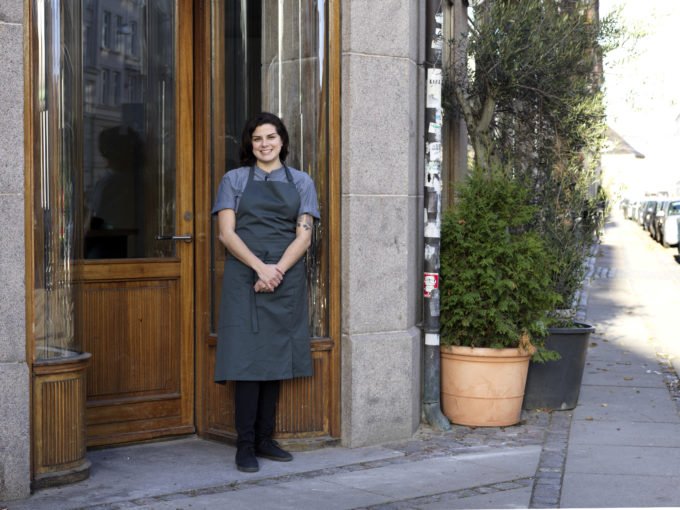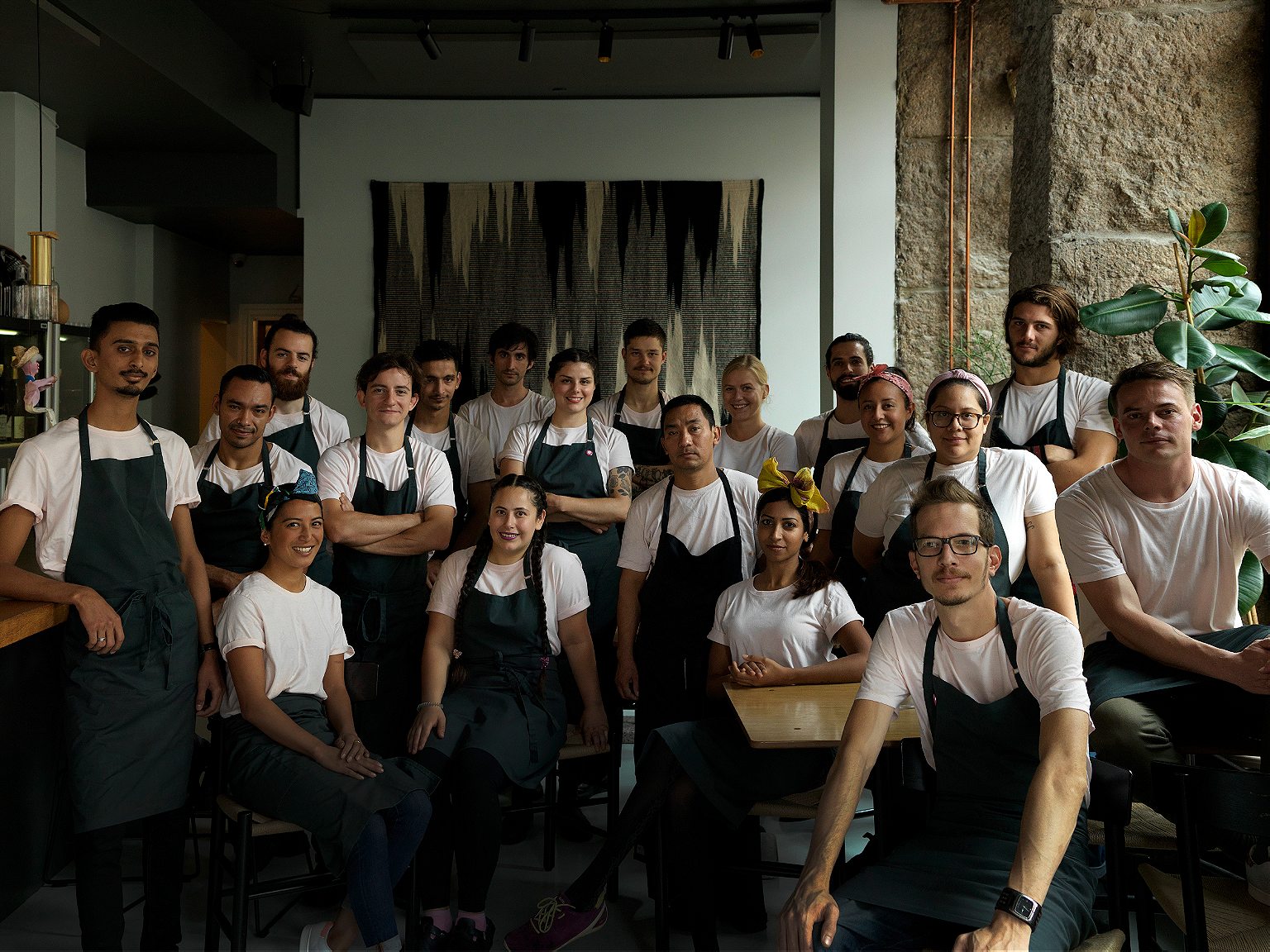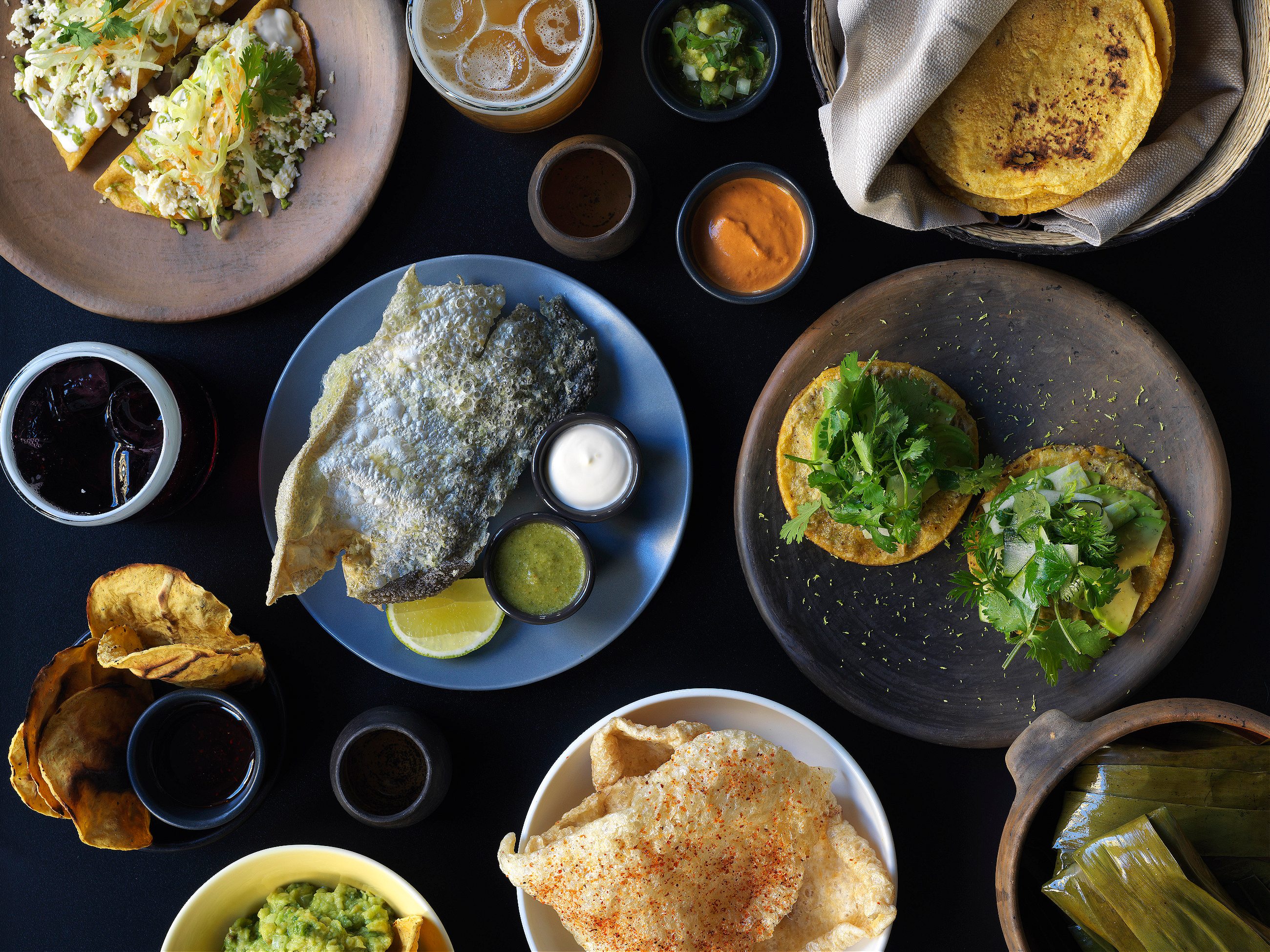
Tacos in Viking Country with Rosio Sanchez

Rosio Sanchez’s Mexican flavors have made her an international culinary star, from her base in… Denmark.
One of the great shortcomings of northern Europe—an otherwise pleasant place with soft sunsets and universal healthcare—has always been the utter lack of quality Mexican food. Rosio Sanchez, a celebrated restaurateur and chef from Chicago who has worked at some of the best restaurants on earth, is changing that. This week on The Trip: Drinking with Exceptional People Around the World, she talks to Nathan about living in Copenhagen, cooking fjord shrimp in salsa diabla, and what authenticity means to her.
Here is a condensed transcript of the conversation. You can listen to the full episode, for free, on Apple Podcasts, Stitcher, Spotify, or wherever you get your podcasts.
Nathan Thornburgh: I should say before we start that we’re recording this interview in this sort of adorable attic room in Christiania, and there’s like a Disney movie bird scene that’s happening outside. We’re not feeding ambient noise into the podcast. There are actual birds chirping outside.
So Rosio, you run a taqueria called Hija de Sanchez. How would you define Sanchez?
Rosio Sanchez: It’s a very casual place. People could say we make Mexican food, but I like to say that we just try to make very tasty food with Mexican flavors because we are not very authentic.
Thornburgh: The question that is going through my mind, and I’m sure it’s going through everybody else’s mind, is how did you get here? Why Copenhagen?
Sanchez: When I was working in Spain, I got an email from a friend saying that there was an opening at Noma. I said I will be there in two weeks. I dropped all the stuff that I was doing in Spain and moved here to Copenhagen.
Thornburgh: That was it. Was it a pastry job?
Sanchez: It was a pastry job, but I didn’t even ask before I took the job. I just said yes.
Thornburgh: Wow. You were that fired up.
Sanchez: I was that fired up to learn something new and to be challenged in many different ways.
Thornburgh: And that wasn’t happening in Spain?
Sanchez: Well, yes. But I really wanted a major challenge and to learn a different culture and different flavors. I didn’t really see that in Spain for me. So I went to Noma and was there for about five years. I was their pastry chef for the whole time, but for the last three years, I was mainly in the test kitchen. That was the best job in the world.
Thornburgh: While you were at Noma, were you bringing in some of your Mexican palate to the stuff you were doing or were you trying to keep it kind of neutral?
Sanchez: There was definitely some Mexican influences. I think I was unknowingly infusing what I was doing with Mexican influences. The great thing about having an international team working on whatever project is that everybody has their own outlook. I remember making this koji mole.
Thornburgh: Koji mole?
Sanchez: Yes. I was roasting the koji because I wanted to make a dessert with it. I was doing other things, and I left the koji in the oven and it completely burned. I remember I came back from the other room and someone had left it on my cutting board as a way of saying you fucking idiot. I tried it and I thought, wow, it’s just like coffee beans or something because it had a beautiful roasted smell. So, I started infusing it in different liquids and it was very tasty. The grain itself was also very tasty, so I made a sauce from it and had all the nuances of like a really well-balanced, complex chile.
I was like, oh my God it tastes like mole! There was this German guy next to me and looking at me blankly like “I don’t know what mole is.” Luckily, I did have a Mexican girl there and she said it tasted like mole.
Related Reads
Thornburgh: So you got some sort of validation of the idea. Meanwhile, the German guy’s wondering why you don’t get this amazing pork and mustard combination that he’s come up with.
So, you were born in Chicago. Had you spent time in Mexico?
Sanchez: I’ve been there a few times. Maybe once every few years, but it wasn’t until I was 19 that I started going on my own. I would go there for personal reasons or for research after I decided I wanted to get into the food business.
Thornburgh: But you never had a job in Mexico?
Sanchez: No, no. I wanted to, I wanted to, but my life went into different directions.
Thornburgh: Well, we are in fucking Denmark.
Sanchez: Yeah, and it was something that my parents were not really happy with. I think because they were immigrants from Mexico, they’re like, “Oh, you shouldn’t really go there.” I wanted to go cook in a restaurant. And they’re like, “please don’t do that.”
Thornburgh: I feel like, for a lot of immigrants, it’s just like, “you know we left that place for decent reasons.”
Sanchez: And I felt that it wasn’t a fight I wanted to pick with my parents, especially since they were so supportive of everything else I’ve done. I guess just decided to find another way into the food business.

Thornburgh: What’s the lineage there for cooking? Is it new to your family?
Sanchez: Well, my mom wasn’t the best cook but she did make some really nice dishes.
Thornburgh: What is her style like?
Sanchez: Oh, it’s very homey. Very homey. I love my mom’s pozole. Every time I go home I’m like, please make me pozole! We make a pozole in the restaurant. It’s a simple dish, but we make it with gooseberries. It’s never going to be as good as mom’s pozole, so you just make a different pozole.
Thornburgh: Right. You have to go for it.
Sanchez: Right.
Thornburgh: And then, of course, Chicago, where you grew up, was a place with like a century of Mexican-American culture. The food there is incredible.
Sanchez: You can get by without even speaking English.
Thornburgh: Now the gentrifiers are like chasing people from the neighborhood to neighborhood, but it’s still incredible. The food is incredible.
What is it like to try to represent a piece of that here in Copenhagen? I assume a lot of people who come through your restaurants probably think this is like the best Mexican food they’ve ever had. Listen, the food at your restaurants is amazing, but I don’t think people here would probably have gone to any place that’s really tried. Is that why you have to put some caveats on it to sort of say this is one way of doing it?
Sanchez: Yes. This is our way. We don’t want the authenticity police coming over. We know the essence of what we’re doing. We don’t know everything, but we know the basis of Mexican cooking and the feelings that you’re supposed to be getting. I want to make people feel like they’re kind of eating in someone’s home.
Thornburgh: Do Danish people come to your restaurant?
Sanchez: Yeah, they do come. I’m very happy that they’re coming. When we opened, we had a lot of locals and that made me so happy and proud because I feel that this is what the restaurant is for. I’m trying to make a neighborhood place so you can say, “oh, I go here for my tacos.”

Thornburgh: What are their feeling about Mexico and Mexicans?
Sanchez: There are two kinds of people. There are the people who are like, “Bravo, thank you. This is cool and I’m so happy that I can taste all these flavors. Good job.” And then there are the people who are like, ” I can’t believe Mexican food is this expensive and blah blah blah.” That’s fair enough. I mean…
Thornburgh: That’s their right to not understand.
Sanchez: I always tell my staff that there are people that are going for the Shake Shack or Gasoline Grill here in Copenhagen, which is my favorite burger place, but there are people who go for that and quality or they go to McDonald’s. And those people will always go to McDonald’s.
Thornburgh: Yeah. And the people who go to McDonald’s will probably always walk into Gasoline Grill and ask, “why are these burgers so expensive?!”
Sanchez: Yeah. And so it’s like you can’t fight it.
Thornburgh: One of the great deficits of Europe has always had—northern and central Europe in particular—has been Mexican food. I think for even me, a person who doesn’t come from a Mexican family having access to good, fresh Mexican food is almost an American birthright.
Sanchez: We get a lot of Americans who think what we are doing at the restaurant is cool. One of the things I do like about the States is that people are so open to eating many different kinds of foods.
Thornburgh: Yeah, we’re gonna we’re going to be ending that soon. Everybody’s going to eat fucking mayonnaise sandwiches and march in military parades. How are you feeling about Copenhagen as your future place? It was sort of an accident that you ended up here.
Sanchez: It’s been almost nine years.
Thornburgh: That’s a long time.
Sanchez: It is a long time.
Thornburgh: What would you tell people about Copenhagen?
Sanchez: Well, I mean I’ve been here nine years and I’m probably the worst person to ask because I work a lot.
Thornburgh: It’s just a place for a kitchen that you live in.
Sanchez: But I do love working here. On the personal level, I do like biking everywhere. I like that when I’m off, it feels calm and I can wake up with the birds chirping.
It’s a different feeling. When I moved here from New York, I still had this New York attitude. You know…like “shut the fuck up!” and things like that.
Thornburgh: I hear that on a daily basis.
Sanchez: “Get the fuck out of my way!” When I first moved here, I realized that almost everything is closed on Sundays. You can’t do anything but just chill out and do some laundry. At first, I hated it. I felt that it’s was a huge inconvenience because I was so used to everything being available all the time in the States. But now I’ve learned to really love that and just kind of accept things. It’s made me a more patient person.
Thornburgh: I have to tell you. This is like a dangerous thing you’re doing here in Denmark. You’ve got subsidized healthcare, you’ve got great bike lanes, a free education. I’ve always felt that the deal breaker, the one thing that would keep an American from moving to this place and some other European countries is the lack of Mexican food. If you square that circle, then that’ll be it. We’re all going to show up. I lived in Berlin for a long time and I was like, “Fuck, I love this place…but no tacos.”
Sanchez: Or at least some spicy food. Why can’t there be like a really good Thai place with spicy food?
Thornburgh: So, what’s happening after Sanchez? Do you feel like this is the place that you just want to keep working on? Or are we going to see you in the other towns in Denmark?
Sanchez: I really want to focus on Hija de Sanchez for now and see how it develops in a year.
Thornburgh: Sanchez is amazing. I’m fascinated by the great confidence that you have to do to do this and to not let other people define you when in come to creating Mexican food.
Sanchez: In the beginning, it kind of bothered me. I was trying to figure out what kind of box I’m in. I grew up in Chicago, but I always consider myself to be Mexican because I grew up in a Mexican neighborhood. I spoke Spanish as my first language. It wasn’t until I left that I felt like American because everybody’s like, “Where are you from?” I would answer, Mexico, but people would say that I’m from the States. So I was like okay, I guess I’m American. But I didn’t grow up American.
Thornburgh: You definitely grew up American. That’s a very American childhood. What could be more American than that?
Sanchez: But I always tell people I’m from Chicago and I have Mexican parents. Decide whatever you want. It doesn’t matter at the end of the day. I’m a chef and I want to cook the food that my parents grew up eating, so I don’t care anymore.
Thornburgh: That’s a nice place to reach. Does it feel good?
Sanchez: Yeah, it does feel good because I know I can trust myself.
Listen/subscribe to the podcast on Apple Podcasts, Spotify, or Stitcher.
Up Next
Spiritual Advice: Q&A With Shannon Mustipher
The Life and Wanderings
of Chef Andy Ricker
How does one become a successful chef and restaurateur? If there is a standard path, Andy Ricker sure as hell didn’t take it.
Poet and Podcaster Musa Okwonga, Reclaiming Berlin
This week on The Trip podcast: Writer Musa Okwonga on Berlin’s exquisite and heavy psychogeography
Chyno: Beirut Battle Rap
This week on The Trip podcast: Beirut-based, Syrian-Filipino rapper Chyno on Lebanon, rap, and revolution.
21 Things to Know Before You Go to Ho Chi Minh City
How to unravel Vietnam’s southern metropolis.






